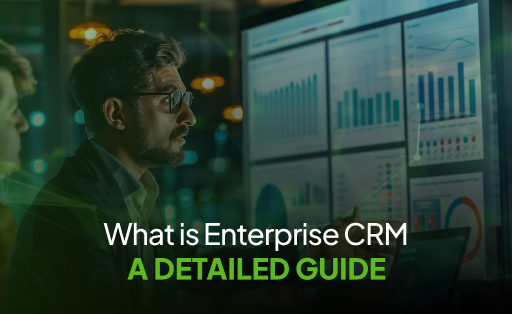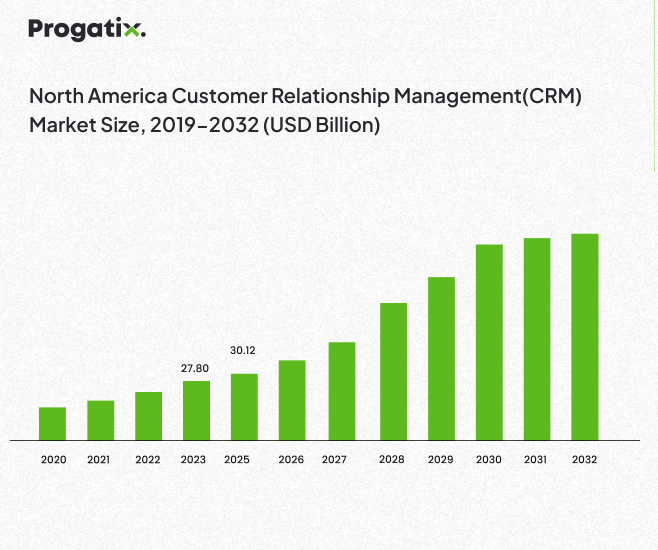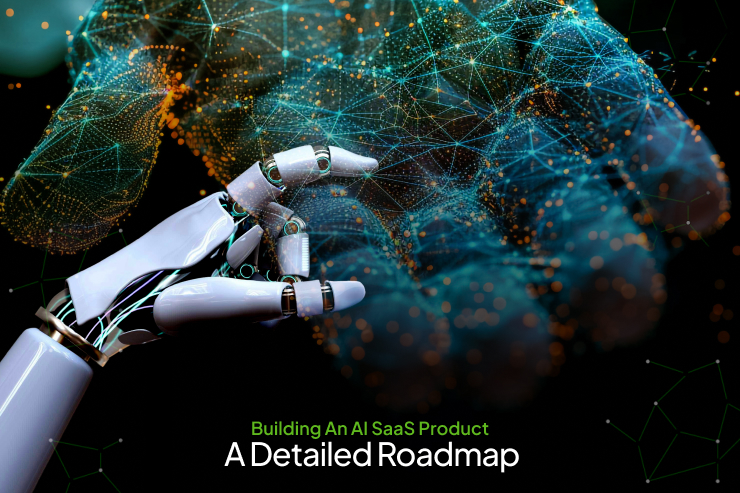What is Enterprise CRM: A Detailed Guide Software Development

Any business ability to handle its customers determines its level of success. A business that does not effectively satisfy its clients will fail and be incapable of making enough money to pay its employees and expand. Customers constantly strive for the best price while buying products or employing services. Therefore, you must know the advantages of CRM software if your company finds value in consistently improving the quality of the products and services it offers to clients.
Your company must develop and retain a loyal customer base to combat strong rivalry and benefit from numerous opportunities in the market. Growing up and improving customer engagement is essential after you have finished growing your customer base. A customer relationship management (CRM) system is important for firms to efficiently handle their client base. However, only a few businesses have integrated these systems into everyday operations. What exactly is CRM software, and why should any business get it? Continue reading to learn more.
If your company is interested in continuously improving the quality of your products and services delivered to clients, then you must understand the benefits of CRM software.
Boost Efficiency with Enterprise CRM Today!
Let's Connect
What Is CRM Software?
CRM, or Customer Relationship Management, is a tool employed by businesses to manage and improve interactions with existing and new customers. By connecting an organization’s sales, marketing, and human resources teams, CRM Software offers real-time access to client activity, preferences, and interactions, streamlining management across departments.
CRM software enables businesses to offer their clients a unique experience while continually improving their services. By addressing their queries, this strategy will ultimately assist you in strengthening your bond with your clients. You can make well-informed decisions about how to improve your goods and services if all of your client data is integrated in one place. It also helps you identify new prospects and engage with potential consumers.
Enterprise CRM Market Size
The global enterprise customer relationship management (CRM) market size was estimated at USD 91.43 billion in 2023 and is anticipated to grow from USD 101.41 billion in 2024 to USD 262.74 billion by 2032, demonstrating a CAGR of 12.6% during the forecast period. According to the study by Fortune Business Insights.
Advantages Of Using CRM Software
Here are the key advantages of using CRM software.
-
Better Customer Awareness
Though this might seem like something easy to get, having a client’s details offers businesses an immense advantage. Using CRM software, you can keep all the client data in one location. Details comprising the client’s full name, phone number, mailing address, social media profiles, email address, website, and other relevant information will be immediately available to you. It improves customer experience by allowing you to effectively communicate with your customers.
-
Improved Customer Categories
An active customer base is the foundation of any successful business. Building an interpersonal connection with the clients you assist is important. With CRM, you can segment your whole client base to deliver personalized services to each one. CRM can be an ideal tool for classifying your customers based on predetermined criteria.
-
Improved Customer Retention And Loyalty
The greatest way to manage your existing clients is undoubtedly a CRM. It offers certain benefits to retain customers besides helping you with planning follow-up emails and informing clients of upcoming appointments. Moreover, the application informs you about customers who haven’t purchased anything recently, and you can write emails to reach them.
-
Helps In Cost-Saving And Growth
After implementing CRM, companies have asserted a significant increase in profits. AI-powered market automation helps companies by simplifying monotonous tasks boosting efficiency while saving money and resources. Finding high-value accounts is made easier by enterprise CRM solutions, eventually increasing account-based marketing and revenue in general.
-
Improved Knowledge Of Customer Needs And Preferences
With CRM, you can relate to your customers more confidently. It enables you to know their accurate information including the history of client interactions and purchases, allowing you to plan on catering to their needs.
-
Helps In Data-driven Decision-Making
Uncertain findings tend to result from decisions made without data or its support. These days, CRM is used by a huge number of businesses with a wide range of employees. With advanced data analytics technologies built, CRM helps you examine customer behavior, trends, patterns, and other variables. Additionally, CRM systems can offer predictive analytics, which is much valued nowadays, to predict demand and alter personalization correspondingly.
Key Features Of Enterprise CRM
Here are the key features enterprise CRM offers.
-
Lead Management
The lead management tool allows users to create, track, and measure interest in leads from the initial point of contact to the sale conversion. Its proficiency in lead sorting, follow-up, and conversion improves conversion rates.
-
Marketing Automation
The marketing automation tool makes automating repetitive marketing processes possible. It creates individualized tactics and contributes to the marketing campaign’s productivity.
-
Sales Pipeline Management
By offering a visual representation of your sales, the sales pipeline CRM feature allows you to assess the progress of deals as they progress across different cycles. Doing so will enhance your visibility and keep you from losing out on an offer.
Reporting And Analytics
-
The Reporting And Analytics
Tool offers real-time data related to your performance in sales, marketing, and customer service. Reports can be personalized as per the company’s specific requirements to facilitate data-driven decision-making and offer insights into potential vulnerabilities.
-
Contact Management
The contact management feature gathers all customer data and makes it readily available to your team. It can help keep records of various customers and their information handy to enhance communication patterns.
-
Mobile CRM
The mobile CRM feature lets you access any of your dashboards remotely. It makes the team successful by allowing them to keep up-to-date information from any location. Effective customer data management is made possible by multiple additional features. It depends on your company size, the nature of your business, and market trends.
Difference Between Enterprise CRM And Traditional CRM
Keep reading to understand the major difference between the two:
-
Integration And Customization
Traditional CRM
The integration scope is insufficient in a standard CRM. In a number of situations, third-party software integration is required to customize the program according to users’ demands. However, unless the CRM software supplier modifies its core system, integration and customization are limited.
Enterprise CRM
Solutions for enterprise CRM are designed with seamless integration in mind. Their goal is to utilize a single software program for managing the whole corporate environment. To improve decision-making, the marketing and sales teams, along with other departments, integrate and contribute to the centralized data system.
-
Scale And Complexity
Traditional CRM
Its main goals are to meet the demands of small and medium-sized enterprises and simplify their data storage systems to improve sales procedures.
Enterprise CRM
It is intended to meet the extensive and intricate demands of huge businesses. The requirements and desires of millions of clients are managed by a single integrated system uniting multiple departments.
-
User Experience And Collaboration
Traditional CRM
Traditional CRM leaves little to no room for role-based access. The fundamental characteristics of collaboration make large-scale team integration impractical.
Enterprise CRM
The sophisticated features facilitate multi-channel communication. Additionally, they give users role-based access so they may utilize the tools relevant to their jobs, improving collaboration and efficiency.
-
Advanced Features
Traditional CRM
Its main goal is to facilitate fundamental functions like contact management, customer service, and sales monitoring. Anything more is either too expensive or only accessible with additional payment.
Enterprise CRM
Predictive analytics, automation, machine learning, and artificial intelligence are only a few of the innovative components necessary for effective business operations. They help with regulating the sales pipeline, spotting potential clients, and creating tailored strategies.
-
Data Management And Security
Traditional CRM
It provides a useful tool for data management. With the management of a small dataset as a key goal, the security features and regulatory compliance are not extremely intricate.
Enterprise CRM
It provides an extensive data management tool. Despite being dedicated to managing huge quantities of data, the security features are highly advanced, with regulation consistency, data integrity, and security against breach guaranteed.
-
Cost & Investment
Traditional CRM
Small and medium-sized enterprises with limited budgets can create strategies personalized to their needs at reasonable prices.
Enterprise CRM
Sufficient funds and dedicated employees are a requirement for an effective deployment. Return on investment results from improved productivity, more customer fulfillment, and higher revenue.
Challenges Enterprise CRM Software Deals With
Enterprise CRM software has the power to transform organizations, nurture improved customer relationships, streamline operations, and improve productivity. However, as businesses expand, several different challenges arise in executing and connecting the complete potential of CRM systems custom-made for the enterprise space.
Let’s have a look at the challenges faced by large organizations when dealing with enterprise CRM software:
-
Resistance To Activity Logging Within Enterprise CRM
While it is simpler to persuade smaller teams to use activity logging, managing hundreds of salespeople significantly changes the circumstances. Employee resistance may result from the sheer size of the workforce, since they might be concerned that their performance will be micromanaged or evaluated. This reluctance may lead to data that is erroneous or lacking, which could ultimately damage the CRM system’s effectiveness.
-
Poor User Adoption On An Enterprise Scale
Large companies find it more difficult to adopt new CRM software because of the huge number of users and the challenge of providing one-on-one, practical training. Poor training, complexity, and a lack of awareness related to the software’s benefits can result in low user adoption. Effective change management and in-depth training are required to overcome these challenges.
-
Incomplete Data Challenges In The Enterprise Space
Data management becomes more complex as organizations develop. The CRM system’s capability to deliver accurate analytics and important insights could be affected by incomplete or inconsistent data resulting from manual data entry, data duplication, and a lack of strong data management practices.
-
Limited Insights And Uninformed Decision-making At An Enterprise Level
Larger firms need to integrate silos and other data sources to get profound insights. It might be challenging to organize and evaluate data from several sources, leading to insufficient understanding and uninformed decisions. As a solution, strong data integration strategies and advanced analytics abilities are required.
With numerous advantages, enterprise CRM comes with some specific challenges that you will have to face during its deployment. Organizations can unlock the complete potential of enterprise CRM systems while accomplishing significant growth and success by recognizing and swiftly addressing these challenges.
Unleash Potential with Comprehensive CRM Insights!
Let's Connect
How To Choose The Best Enterprise CRM Software For Your Company?
It could be challenging to choose the best platform for you, given the level of competition in the CRM market at present. To assist you in making an informed choice that will benefit your business, we developed a checklist.
-
Carefully Analyze Your Business Goals And Needs.
Prior to purchasing customer relationship management software for your company, you should have a defined set of goals. Prioritizing the essential productivity tools is supported by goal planning.
-
Look For The Integration Capabilities.
CRMs are developed for a variety of reasons. Having a 360° solution for every challenge, its inclination toward a specific segment is greater. Therefore, it is suggested to check the software’s integration capabilities to ensure it meets the requirements of your business.
-
Calculate ROI
If your CRM costs more than the revenue you gain from it, it’s time to change your subscription. Using sales forecasting strategies, you can predict future sales and pick the best CRM software with reliability.
-
Review The Vendor’s Reputation.
Considering the situation of the global market today, figuring out the credibility of an organization is effortless. Think about things like case studies, industry knowledge, customer reviews, onboarding, and ongoing support.
-
Take A Free Trial
Normally, reputable businesses offer their clients free trials for a specified amount of time. Make your choice by using the chance to communicate with their support staff and software.
Start Your Enterprise CRM Journey With Progatix
Enterprise CRM use cases can considerably benefit your business, allowing you to succeed in the present-day customer-centric marketplace and secure a lasting place in your customers’ hearts. From improving customer relationships to simplifying marketing efforts and improving sales performance, the benefits of enterprise CRM systems are several and affecting.
If you are looking for a custom enterprise CRM system personalized to your business requirements, then reach out to Progatix. Progatix is a leading custom software development company specializing in CRM integration and custom CRM development services designed to boost growth across a range of industries.



 Let's Discuss Your Tech Solutions
Let's Discuss Your Tech Solutions 






